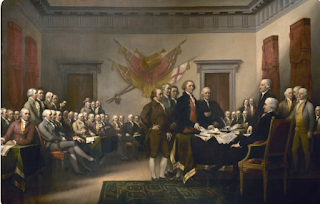Forging a New Identity Through Literature and Revolution
At the end of the 18th century, American writers began to express a spirit different from that of the early colonists. A single event captured their attention, and the Americas they inhabited were no longer an uncharted wilderness, but a rapidly changing society seeking to define its national identity.
The American Revolution not only transformed society but also fostered a new literature that sought to define national identity. Authors of this era did not simply narrate colonial life but actively participated in the construction of a national consciousness. Their pens became intellectual weapons that championed the ideals of liberty, independence, and self-determination.
This generation of writers faced the unique challenge of creating a national literature that distinguished itself from the European tradition while establishing the cultural foundations of a new nation. Through political pamphlets, philosophical essays, public letters, and early attempts at American fiction, these authors forged the foundations of what would later become a distinctively American literary tradition.
The revolutionary period gave rise to extraordinary writers who not only documented the struggle for independence but also helped shape the emerging American identity through their powerful and persuasive words. These authors, with their diverse voices and innovative approaches, played a central role in fostering revolutionary thought and inspiring collective action.
Thomas Paine: His pamphlet Common Sense (1776) was a turning point in public opinion. Written in accessible and passionate language, it urged colonists to break free from British rule and embrace the idea of self-governance. Paine’s writing was instrumental in galvanizing support for the revolution among everyday citizens.
Benjamin Franklin: A true polymath, Franklin used his wit and wisdom in essays, letters, and publications like Poor Richard’s Almanack to promote Enlightenment ideals such as liberty, reason, and civic responsibility. His literary contributions helped lay the intellectual foundation for American democracy.
Phillis Wheatley: As the first African-American woman to publish a book of poetry, Wheatley’s work was groundbreaking. Despite being enslaved, she wrote eloquent poems that celebrated freedom, virtue, and the revolutionary cause. Her poem honoring George Washington gained national attention and symbolized the universal yearning for liberty.
Thomas Jefferson: Best known as the principal author of the Declaration of Independence, Jefferson’s writing combined Enlightenment philosophy with a bold vision of human rights and national sovereignty. His Notes on the State of Virginia further showcased his literary and intellectual depth, blending political theory, natural science, and cultural commentary. Jefferson’s eloquence helped define the moral and ideological framework of the new nation.
These writers did more than reflect the revolutionary spirit—they actively shaped it. Through pamphlets, poems, essays, and declarations, they used the written word as a tool of resistance, persuasion, and nation-building. Their legacy endures not only in the founding documents of the United States but also in the enduring belief that ideas—and the words that express them—can change the course of history.
🧠 Personal Analysis:
What fascinates me most about this literary period is how these writers transformed themselves from colonial subjects into architects of a new nation through their words. The courage required to break with centuries of European literary tradition is undeniable: these authors, in essence, declared cultural independence alongside political independence.
Thomas Paine’s Common Sense perfectly exemplifies this transformation. Rather than using the complex, aristocratic language typical of European political discourse, Paine wrote in simple, accessible prose that any farmer or merchant could understand. This wasn’t merely a stylistic choice—it was a revolutionary act that democratized political thought.
The diversity of genres during this period—from Benjamin Franklin’s witty essays to the powerful poetry of Phillis Wheatley—reflects the urgency these writers felt in defining American identity. Every form of writing became a tool for nation-building, proving that literature can serve purposes far beyond entertainment.
What I find most remarkable is that these writers didn’t simply document history—they actively shaped it. Their pamphlets persuaded colonists to support independence, their essays articulated the principles of democracy, and their letters helped maintain unity among the colonies. Literature became a weapon as powerful as any musket in the Revolutionary War.
🌐 Connection to the Present
The revolutionary writers of the 18th century remind us that words have the power not only to reflect society, but to transform it. Today, as we continue to wrestle with questions of identity, justice, and democracy, the legacy of these early American authors feels especially relevant. In a world shaped by social media, political polarization, and global crises, we’re once again witnessing how literature—whether in the form of op-eds, protest poetry, memoirs, or blogs—can spark dialogue, build communities, and challenge power structures.
Just as Thomas Paine made political philosophy accessible to ordinary citizens, today’s writers strive to democratize information and inspire civic engagement. Voices once marginalized, like Phillis Wheatley’s, now echo loudly in a literary landscape more inclusive than ever before, pushing forward conversations on race, gender, and equity. And in a time when facts are contested and narratives weaponized, Franklin’s commitment to critical thinking and public reason has never been more vital.
The revolutionary era teaches us that literature is not just a mirror—it’s a forge. In every era, writers are the quiet architects of change, chiseling out new possibilities for how we see ourselves and the world around us.
Sources Consulted
📚 To learn more about the beginnings of American literature:
https://www.encyclopedia.com/history/educational-magazines/literature-and-arts-revolutionary-era
https://literopedia.com/what-is-the-revolutionary-period-in-american-literature
https://www.ebsco.com/research-starters/literature-and-writing/revolutionary-literary-period
📖 Discover the writers of the Revolutionary Period:
https://www.britannica.com/biography/Thomas-Paine/In-Europe-Rights-of-Man
https://www.battlefields.org/learn/articles/common-sense
https://www.britannica.com/biography/Benjamin-Franklin/Public-service
https://www.ushistory.org/valleyforge/history/franklin.html
https://es.wikipedia.org/wiki/Phillis_Wheatley
https://en.wikipedia.org/wiki/Early_life_and_career_of_Thomas_Jefferson






No comments:
Post a Comment